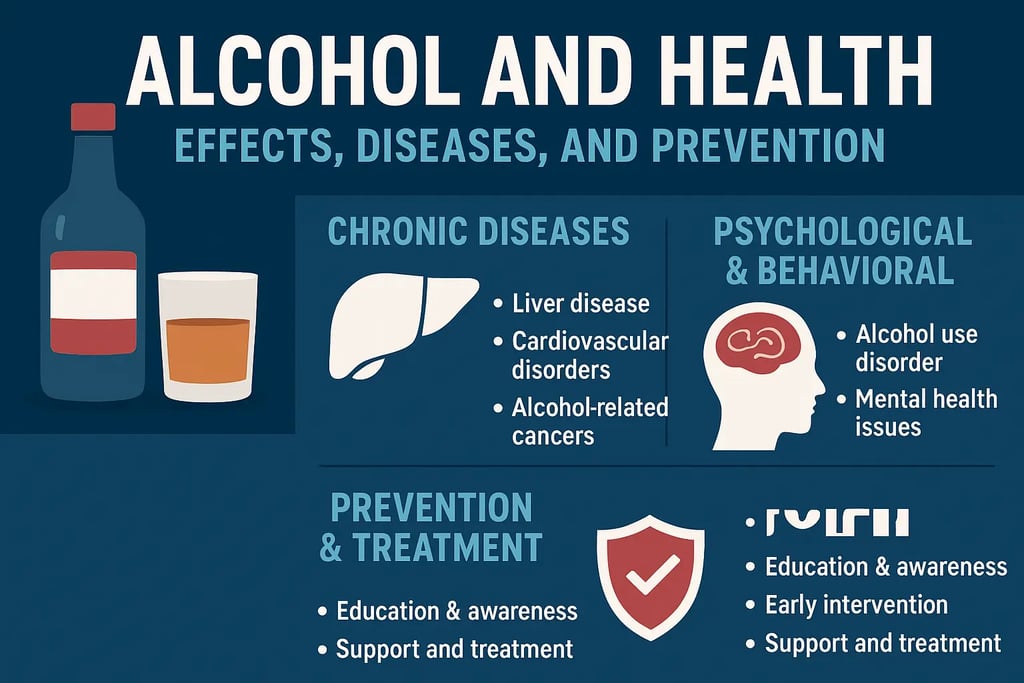Alcohol Use Disorder and Health: Effects, Diseases, and Prevention Strategies
Learn how alcohol use disorder affects your physical and mental health. Discover the chronic diseases linked to alcohol consumption, its psychological impact, and effective prevention and treatment options for long-term recovery.


Introduction to Alcohol and Its Impact on Health
Alcohol Use Disorder is one of the most commonly consumed psychoactive substances worldwide, deeply embedded in social, cultural, and recreational settings. Classified as a depressant, alcohol primarily affects the central nervous system, slowing down brain activity and impairing functions such as judgment, coordination, and reflexes. While moderate consumption can induce temporary relaxation or euphoria, its long-term effects on health are far from harmless.
Excessive and regular alcohol consumption can lead to serious health complications, including liver damage, heart disease, and mental health disorders such as anxiety and depression. The impact of alcohol extends beyond individual health—it also affects families, communities, and healthcare systems globally. According to health organizations, millions of people suffer from alcohol-related disorders that contribute significantly to disease burden and mortality rates.
Raising awareness about the consequences of alcohol use is essential to promote informed choices and reduce risks. Understanding how alcohol affects both physical and mental health is the first step toward making responsible decisions and preventing chronic diseases associated with long-term alcohol use.
Chronic Diseases Associated with Alcohol Consumption
Regular alcohol intake can have devastating effects on various organs and bodily systems. Some of the most severe chronic diseases caused by alcohol include:
1. Liver Diseases
The liver is the primary organ responsible for metabolizing alcohol. Continuous heavy drinking can cause alcoholic hepatitis, fatty liver, and cirrhosis—a condition characterized by irreversible scarring of liver tissue. Over time, these disorders can lead to liver failure, requiring medical intervention or transplantation. Alcohol-related liver disease also weakens the body’s ability to process medications and nutrients, worsening overall health.
2. Cardiovascular Disorders
Excessive alcohol consumption significantly increases the risk of high blood pressure (hypertension), stroke, and heart failure. Long-term alcohol use can result in alcoholic cardiomyopathy, a condition in which the heart muscle becomes weak and cannot pump blood efficiently. Combined with other risk factors such as obesity or diabetes, alcohol amplifies the likelihood of severe cardiovascular complications.
3. Alcohol-Related Cancers
Scientific studies have established strong links between alcohol and several types of cancer, including liver cancer, esophageal cancer, breast cancer, and oral cancers. Ethanol—the main component of alcohol—and its byproduct acetaldehyde are carcinogenic, damaging DNA and interfering with cell repair mechanisms. People with long-term drinking habits face a much higher risk of developing these malignancies.
Understanding these connections between alcohol and chronic diseases is vital for prevention and early intervention, which can dramatically improve life expectancy and health outcomes.
Psychological and Behavioral Effects of Alcohol Use
Alcohol doesn’t just harm the body—it profoundly impacts the brain and behavior. One of the most serious psychological conditions linked to drinking is Alcohol Use Disorder (AUD), characterized by compulsive drinking despite negative consequences.
People suffering from AUD often experience depression, anxiety, and other mood disorders. Many individuals initially use alcohol as a coping mechanism for emotional distress, but over time, dependence develops, worsening mental health symptoms. This creates a harmful cycle where alcohol temporarily relieves distress but ultimately deepens psychological struggles.
Integrated treatment approaches that address both addiction and mental health are the most effective. Evidence-based therapies such as Cognitive Behavioral Therapy (CBT) and Motivational Enhancement Therapy (MET) help individuals modify negative thinking and behavioral patterns. Participation in support groups, like Alcoholics Anonymous (AA), also plays a crucial role in building resilience and long-term recovery.
Recognizing the connection between alcohol use and mental health is essential for comprehensive care and lasting well-being.
Prevention, Treatment, and Support Options
Preventing and treating alcohol-related health problems requires a holistic approach combining education, early intervention, medical treatment, and community support.
1. Education and Awareness
Public health campaigns, school programs, and community outreach initiatives help spread awareness about the dangers of excessive drinking. Educating individuals about the signs of dependency and long-term risks can encourage moderation and responsible consumption.
2. Early Intervention and Screening
Healthcare professionals should regularly screen for alcohol use patterns during routine check-ups. Early detection of alcohol misuse allows for timely referral to specialized care before chronic diseases develop.
3. Medical and Therapeutic Treatment
Rehabilitation programs, both inpatient and outpatient, provide structured environments for recovery. These programs combine medical detoxification with psychological therapies to address the root causes of addiction. Cognitive Behavioral Therapy (CBT), counseling, and medication-assisted treatments have shown positive outcomes for individuals battling alcohol dependency.
4. Family and Community Support
Support from family members and peers is crucial for recovery. Family therapy can resolve underlying conflicts that contribute to alcohol misuse, while peer support groups create a safe space for sharing experiences and maintaining motivation during recovery.
5. Lifestyle Modifications
Long-term sobriety is supported by adopting healthy habits such as balanced nutrition, regular exercise, stress management, and mindfulness practices. These positive lifestyle changes not only aid in recovery but also prevent relapse and enhance overall health.
Conclusion
Understanding the profound impact of alcohol on health is essential for promoting a balanced and responsible lifestyle. From chronic diseases like liver and heart disorders to psychological conditions such as anxiety and addiction, the consequences of excessive drinking are far-reaching. Through awareness, early intervention, and community support, individuals can break free from alcohol dependency and lead healthier, more fulfilling lives.
